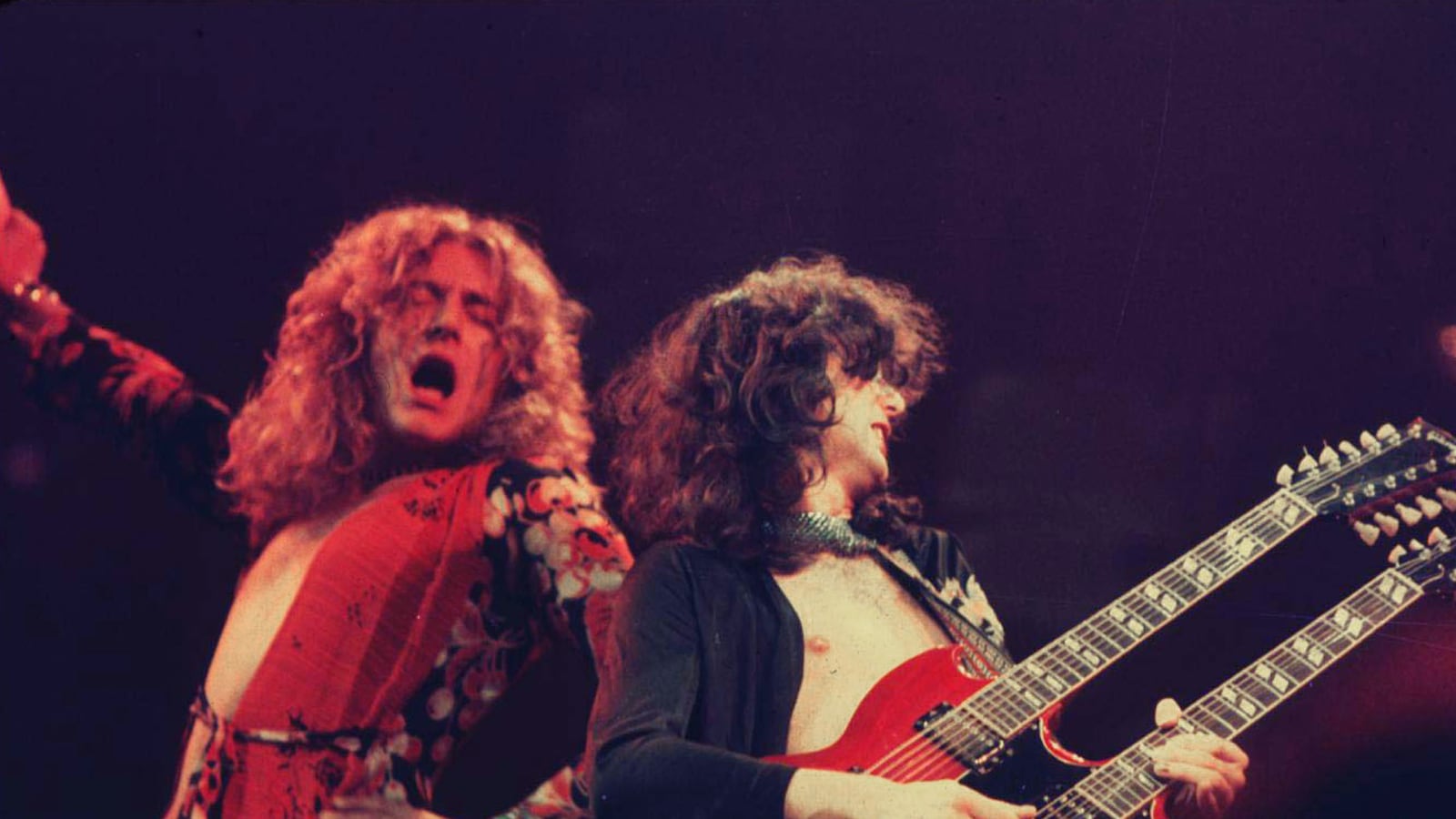When Wayne Campbell, the public-access cable host/hockey enthusiast played by Mike Myers, visits a music store in the 1992 comedy Wayne’s World, he knows exactly what he wants to play. Picking up a guitar, he launches into the first few notes of Led Zeppelin’s “Stairway to Heaven” only to be cut short by a clerk pointing to a sign reading “No ‘Stairway to Heaven.’”
The joke’s pretty simple: Virtually all aspiring rockers, at least from Wayne’s era, attempt to learn that song early on and use it to impress their friends. The joke got more complicated, and less funny, when Led Zeppelin refused to allow those notes to appear in any versions of the film after its theatrical release, from VHS to cable airings. In the film’s current form, Wayne picks up a guitar and plays a few random notes that sound nothing like “Stairway,” rendering the gag incomprehensible in the name of the band’s legal rights over the song.
Now the group finds itself on the other side of a legal claim concerning its “Stairway to Heaven,” thanks to a lawsuit filed by The Randy Craig Wolfe Trust, which controls the intellectual property of the musician better known as Randy California, founder of the band Spirit. (California died in 1997 while rescuing his son from drowning in Hawaii.) Yesterday the suit overcame the band’s first attempt to dismiss it or move the case to California from its original venue in Philadelphia, where it was filed by Pennsylvania-based lawyer Francis Alexander on May 31.
The suit, whose headers include a font familiar to Led Zeppelin fans, is based on a similarity between “Stairway to Heaven” and “Taurus,” an instrumental track included on Spirit’s self-titled 1968 debut album. In the words of the suit, the iconic notes of “Stairway” “have enthralled generations of fans, sound almost exactly the same as California’s ethereal yet classical guitar composition in ‘Taurus.’”
Strong words. For the sake of comparison—and I’m assuming that “Stairway to Heaven” is already running through your head—here’s the Spirit track:
Lawsuits alleging musical plagiarism pop up all of the time—witness the increasingly embarrassing legal tangles between Robin Thicke and the estate of Marvin Gaye—and they unavoidably involve legal gray areas. One person’s definition of theft is another person’s definition of inspiration. And since music, like all forms of art, is an endless cycle of inspiration and innovation, it’s tough to know where to draw the line. To help make a case, the suit attempts to establish both opportunity and a pattern of plagiarism on the part of the band.
Everyone knows Led Zeppelin. Outside of fans of ’60s psychedelia, Spirit is today best known for “I Got a Line on You,” a 1968 hit that still gets play on classic-rock radio. (Film fans also know the band for its soundtrack to the Jacques Demy film Model Shop.) Yet in late 1968, Led Zeppelin was the less-famous band, opening for Spirit on a series of dates. During this time, per the suit, “Jimmy Page’s use of the Etherwave-Theremin, and other psychedelic-type audio effects which helped give Led Zeppelin its distinctive sound—especially prominent in ‘Whole Lotta Love’—was inspired by seeing California effectively use these types of audio-enhancing effects on tour.” Bios of Led Zeppelin have noted this, and Page has never denied it. Similarly, the band indisputably played Spirit’s “Fresh Garbage” while on tour the following year.
Attorneys for Page, and the rest of the band, do deny that “Stairway to Heaven” is derived from “Taurus,” which Page claims has its origins in the Welsh cottage of Bron-Yr-Aur (immortalized on two different Zeppelin songs). Yet, as the suit establishes at length, California and others had noted the similarity for years and this would hardly be the first time Zeppelin faced legal action for borrowing too liberally.
Famous cases against Zeppelin include those brought by Chess Records in 1972 (targeting “Bring It on Home” and “The Lemon Song” for their similarity to “Bring It on Home” by Sonny Boy Williamson and “Killing Floor” by Howlin’ Wolf, respectively) and Willie Dixon (targeting “Whole Lotta Love” for its similarity to Dixon’s “You Need Love”). The accusations haven’t tapered off in recent years, either. In 2010, Jake Holmes sued over “Dazed and Confused,” claiming it bore a strong resemblance to his own song of the same name. All cases were settled out of court. Some of those songs now have names other than Page and Robert Plant in their credits.
Who stands to gain? Kids with musical aspirations, apparently. According to the suit, the Randy Craig Wolfe Trust, administered by Mick Skidmore—described in a Bloomberg Businessweek article as a “a London-born former rock journalist who works as a customs consultant in Boston, handling paperwork for importers and exporters”—will use the money to “preserve Randy’s memory by supporting the musical aspirations of children in public schools and by developing Randy California’s music portfolio, the proceeds of which buy children in need musical instruments.” Maybe a lot of musical instruments: That same Bloomberg piece notes that the song “had earned at least $562 million” when its earnings were estimated in 2008.
Who stands to lose? Led Zeppelin and its associated labels and song publishers, who would have to share a portion of the songwriting credit with California—meaning everyone gets a smaller piece of an extremely big pie. But it would also be a black eye for Led Zeppelin. “Stairway to Heaven” enjoys pride of place in the band’s catalog and to lose full credit for it would sting.
Losing this case won’t mean Page will be reduced to playing sitar in exchange for food at an Indian restaurant, as California used to do, but it would mean future Wayne Campbells would walk into music shops, start playing their favorite Led Zeppelin song, and in the back of their minds think of it as the one their favorite band stole from that other guy. On the other hand, they might have this lawsuit to thank for putting an instrument in their hands in the first place.






